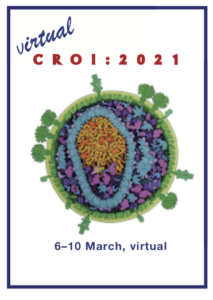Bamlanivimab prophylaxis reduces hospitalisation and mortality: results from phase 3 BLAZE-2 study
1 April 2021. Related: Conference reports, COVID-19: investigational drugs, COVID-19, CROI 28 (virtual) 2021.
 NOTE: Please see comment about lack of activity against recent variants.
NOTE: Please see comment about lack of activity against recent variants.
Simon Collins, HIV i-Base
The BLAZE-2 study randomised 1175 residents or staff who were at high risk of COVID-19 through living or working in residential care homes to either bamlanivimab or placebo.
Of these, 966/1175 were PCR negative, using bamlanivimab as prophylaxis and 209/1175 were PCR positive, using the intervention as treatment.
Participants in the prevention group needed to be PCR negative at baseline with a primary endpoint of incidence of COVID-19 symptoms and secondary endpoint of PCR-positive transmission, both at day 57.
Full results presented at CROI 2021 showed an 80% reduced risk of symptoms: OR 0.20 (95%CI: 0.08 to 0.49), p<0.001.
The top line results from this study had been released in a company press statement in January. [2]
comment
Despite these positive results, bamlanivimab is not longer used for any indication.
This is because bamlanivimab loses sensitivity to variants that recently became dominant including Delta.
This is likely to be a similar concern for other antibodies developed against original strains of SARS-CoV-2.
References
- Cohen M et al. Bamlanivimab prevents COVID-19 morbidity and mortality in nursing-home setting. CROI 2021, virtual. Oral abstract 121.
https://www.croiconference.org/abstract/bamlanivimab-prevents-covid-19-morbidity-and-mortality-in-nursing-home-setting/ (abstract and webcast) - Bamlanivimab (LY-CoV555) prophylaxis prevents COVID-19 in care homes: results of BLAZE-2 study. HTB (24 February 2021).
https://i-base.info/htb/39886
This report was first published on 19 March 2021. It was updated in June 2021 to include the concern about loss of sensitivity to recent variants.

